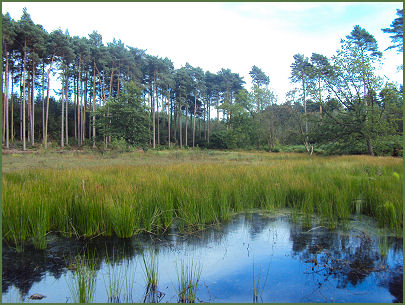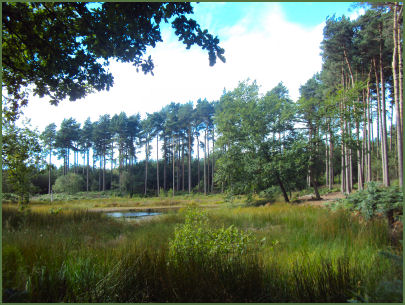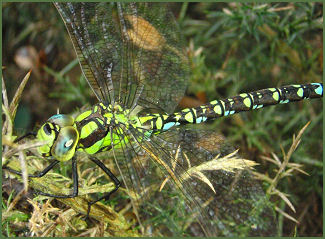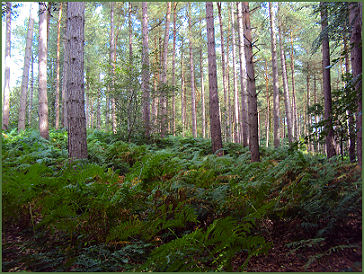<
Black Lake Nature Reserve
O.S. Grid Ref:- SJ537709
Black Lake forms a small nature reserve and is situated in the southwestern corner of Delamere Forest, just south of the Manchester–Chester railway. The lake is a rare example of the early stage in the development of a quaking bog or schwingmoor and has been designated a Site of Special Scientific Interest (SSSI).


A Schwingmoor or quaking bog occurs when plants such as Sphagnum mosses and cotton grass colonise the surface of a body of water, forming a floating mat of vegetation. The depression in which the lake sits was formed by a large melting block of ice at the end of the last Ice Age some 10,000 years ago.
 Over half of the surface of the water is currently covered by a sphagnum 'raft'. On the outer sections of the raft bog flora is visible with young trees and saplings found throughout.
Over half of the surface of the water is currently covered by a sphagnum 'raft'. On the outer sections of the raft bog flora is visible with young trees and saplings found throughout.
The site is noted for its the bog flora and uncommon dragonflies, which once included the White-faced Darter (Leucorrhinia dubia), a small, dark dragonfly with characteristic pale creamy white frons that gives it its name, it is a nationally rare species, which was last spotted at Black Lake in 1997. They disappeared when a crushed limestone path was built around the lake, which changed the PH level. The limestone was later removed and although the raft of vegetation began to recover the white faced darter has not returned. There have no recorded sightings of them at the lake since 1998.
Other species of dragonfly at the lake include Brown Hawker (Aeshna grandis), Four-spotted Chaser (Libellula quadrimaculata), Common Darter (Sympetrum striolatum), Black Darter (Sympetrum danae), Southern Hawker Dragonfly (Aeshna cyanea- pictured left), Large Red Damselfly (Pyrrhosoma nymphula) and Common Blue Damselfly (Enallagma cyathigerum.)
Plants to be found at Black Lake include Common Sundew (Drosera rotundifolia), a carniverous plant that feeds on insects, White Sedge (Carex curta), Common Cottongrass (Eriophorum angustifolium) and Bilberry (Vaccinium myrtillus).
Black Lake is managed by the Cheshire Wildlife Trust on behalf of the Forestry Commission.
A walk to Black Lake
Distance around 2 miles
 *Park at Whitemoor Gate (just past the Barnsbridge Gate car park) in Delamere Forest and head in a southerly direction along the facing forest path.
*Park at Whitemoor Gate (just past the Barnsbridge Gate car park) in Delamere Forest and head in a southerly direction along the facing forest path.
*Remain on this path, ignoring tracks which lead off it, pass the wooden waymarker post numbered 47 and on reaching the waymarker numbered 48 at a fork in the forest track, take the right fork.
* Proceed along this path, which runs alongside the railway line on your right, until reaching the wooden waymarker post marked with the number 49.
*At the T juction at waymarker 49, turn right again crossing the wide bridge over the railway.
*Continue straight on along the track for a short distance until Black Lake comes into sight on your left. A woodland path circles the lake.
*Retrace your steps to return to your car.
